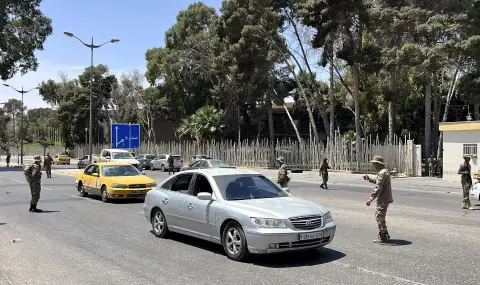Libya's capital is experiencing its fiercest fighting in years after the killing of an influential military leader on Monday sparked a new wave of violence between armed groups. Clashes continued throughout Tuesday night into Wednesday, witnesses in Tripoli said, quoted by “Reuters“, BTA reports.
The United Nations Mission in Libya (UNSMIL) expressed "deep concern" of the escalation of fighting in densely populated urban areas and called for an immediate end to the violence.
The fighting erupted after the death of Abdulghani Kikli, known as Ghaniwa - leader of the powerful paramilitary structure “Stabilization and Support Apparatus“ (SSA). His killing led to the collapse of the SSA and the loss of positions in favor of Brigades 444 and 111 - armed forces loyal to Prime Minister Abdulhamid Dbeiba of the Government of National Unity (GNU).
According to observers, the offensive strengthens Dbeiba's control over the capital, leaving only the “Special Deterrence Forces“ (Rada) outside his influence. It was between them and Brigade 444 that the main fighting took place on Wednesday, reports the Libyan Observer.
Tripoli residents describe the horror of the fighting. "Gathered in a room, we wait, hoping that a shell won't hit us. My children are in shock," said a father from the Dahra neighborhood. In the suburb of Sarraj, people say the fighting only stops briefly: "Every time they fall silent, we think it's over. And then hope dies again."
Since 2011, when Muammar Gaddafi was overthrown, Libya has been in a state of political and military disintegration. Since 2014, the country has been divided between eastern forces controlled by Marshal Khalifa Haftar and his Libyan National Army (LNA), and western factions based in Tripoli.
Although the full-scale war was stopped by a ceasefire in 2020, the armed groups have never been integrated into a national army. Prime Minister Dbeiba said on Tuesday that he would disband “irregular armed groups,” but it remained unclear how he would enforce this in the highly fragmented city.
Experts warn that the escalation in Tripoli could spill over beyond the capital. The ongoing instability threatens not only the country’s political process but also regional security, especially with the involvement of outside powers such as Turkey, Russia, Egypt and the United Arab Emirates.
Libya remains a key energy exporter and a major transit point for migrants heading to Europe, but peace in the capital continues to appear elusive.
